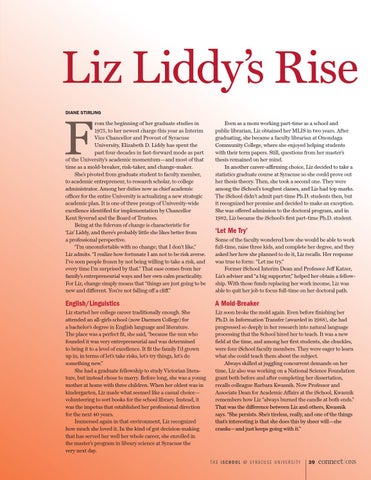Liz Liddy’s Rise DIANE STIRLING
F
rom the beginning of her graduate studies in 1975, to her newest charge this year as Interim Vice Chancellor and Provost of Syracuse University, Elizabeth D. Liddy has spent the past four decades in fast-forward mode as part of the University’s academic momentum—and most of that time as a mold-breaker, risk-taker, and change-maker. She’s pivoted from graduate student to faculty member, to academic entrepreneur, to research scholar, to college administrator. Among her duties now as chief academic officer for the entire University is actualizing a new strategic academic plan. It is one of three prongs of University-wide excellence identified for implementation by Chancellor Kent Syverud and the Board of Trustees. Being at the fulcrum of change is characteristic for ‘Liz’ Liddy, and there’s probably little she likes better from a professional perspective. “I’m uncomfortable with no change; that I don’t like,” Liz admits. “I realize how fortunate I am not to be risk averse. I’ve seen people frozen by not being willing to take a risk, and every time I’m surprised by that.” That ease comes from her family’s entrepreneurial ways and her own calm practicality. For Liz, change simply means that “things are just going to be new and different. You’re not falling off a cliff.”
Even as a mom working part-time as a school and public librarian, Liz obtained her MLIS in two years. After graduating, she became a faculty librarian at Onondaga Community College, where she enjoyed helping students with their term papers. Still, questions from her master’s thesis remained on her mind. In another career-affirming choice, Liz decided to take a statistics graduate course at Syracuse so she could prove out her thesis theory. Then, she took a second one. They were among the iSchool’s toughest classes, and Liz had top marks. The iSchool didn’t admit part-time Ph.D. students then, but it recognized her promise and decided to make an exception. She was offered admission to the doctoral program, and in 1982, Liz became the iSchool’s first part-time Ph.D. student.
‘Let Me Try’ Some of the faculty wondered how she would be able to work full-time, raise three kids, and complete her degree, and they asked her how she planned to do it, Liz recalls. Her response was true to form: “Let me try.” Former iSchool Interim Dean and Professor Jeff Katzer, Liz’s adviser and “a big supporter,” helped her obtain a fellowship. With those funds replacing her work income, Liz was able to quit her job to focus full-time on her doctoral path.
English/Linguistics
A Mold-Breaker
Liz started her college career traditionally enough. She attended an all-girls school (now Daemen College) for a bachelor’s degree in English language and literature. The place was a perfect fit, she said, “because the nun who founded it was very entrepreneurial and was determined to bring it to a level of excellence. It fit the family I’d grown up in, in terms of let’s take risks, let’s try things, let’s do something new.” She had a graduate fellowship to study Victorian literature, but instead chose to marry. Before long, she was a young mother at home with three children. When her oldest was in kindergarten, Liz made what seemed like a casual choice— volunteering to sort books for the school library. Instead, it was the impetus that established her professional direction for the next 40 years. Immersed again in that environment, Liz recognized how much she loved it. In the kind of gut decision-making that has served her well her whole career, she enrolled in the master’s program in library science at Syracuse the very next day.
Liz soon broke the mold again. Even before finishing her Ph.D. in Information Transfer (awarded in 1988), she had progressed so deeply in her research into natural language processing that the School hired her to teach. It was a new field at the time, and among her first students, she chuckles, were four iSchool faculty members. They were eager to learn what she could teach them about the subject. Always skilled at juggling concurrent demands on her time, Liz also was working on a National Science Foundation grant both before and after completing her dissertation, recalls colleague Barbara Kwasnik. Now Professor and Associate Dean for Academic Affairs at the iSchool, Kwasnik remembers how Liz “always burned the candle at both ends.” That was the difference between Liz and others, Kwasnik says. “She persists. She’s tireless, really, and one of the things that’s interesting is that she does this by sheer will—she cranks—and just keeps going with it.”
THE iSCHOOL @ SYRACUSE UNIVERSITY
39 connectiONS
